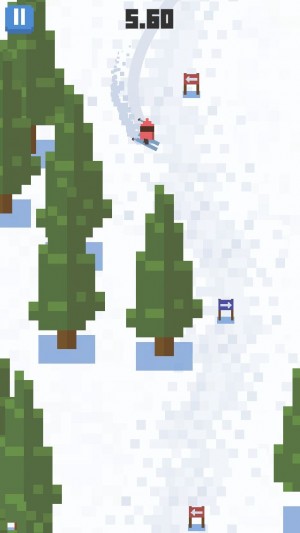In an alternate universe, the game Skiing Yeti Mountain is what Dudeski ($1.99) would be. You control a pixelly skiier traveling down a mountain, slaloming around points to keep going, as if you miss one, you fail the level. The game is centered around many short levels, where you’re trying to get to the end of the lvel as quickly as possible to get gold medals. You level up, and can earn new skiing outfits by doing well. It gets challenging as you have to learn to carve and skid to make slalom turns, and to get down the level fast enough to earn the gold. You either use swipes or a thumb-sliding control scheme to maneuver. The game also quickly starts to throw in new wrinkles, like cliffs you have to jump off of in such a way to go the right direction around the slalom. It’s a game that will really start to throw some clever challenges your way.
What strikes me about Skiing Yeti Mountain is that while it’s different from Dudeski, another game about skiing down a mountain, it’s actually kind of spookily similar. I got to play Dudeski very early on in its development, and it resembles something a bit more like this: more segmented on levels, and featuring skiing physics meant to resemble realistic ones, at least as far as things like carving to control speed goes. But Dudeski went an entirely different direction based on feedback. Static Oceans’ Benedict Fritz was finding that people weren’t enjoying the game when it was more of a level-based game centered around actual skiing mechanics. So he ditched trying to make the skiing feel realistic, and revamped the structure of the game to be something with a bit more of a Spelunky influence, in that you can start from the beginning but work from checkpoints to reach your goal. And there are rewards for doing so.
 This wasn’t necessarily a conscious decision to deviate so wildly – Dylan Bevis of Featherweight Games said that the project started as a way to mix SkiFree with something like Desert Golfing ($1.99) in being level-based. He thinks the games come from the same place, but have a different feel to them. And he’s right, because here you have simulated skiing physics to deal with. You have to make sharp turns to slalom around the courses in order to succeed. Carving back and forth will allow you to maintain your speed. You can’t, say, fall over, and you’re looking for a yeti at the bottom of the mountain, but it’s still meant to feel more like real skiing than Dudeski wound up being.
This wasn’t necessarily a conscious decision to deviate so wildly – Dylan Bevis of Featherweight Games said that the project started as a way to mix SkiFree with something like Desert Golfing ($1.99) in being level-based. He thinks the games come from the same place, but have a different feel to them. And he’s right, because here you have simulated skiing physics to deal with. You have to make sharp turns to slalom around the courses in order to succeed. Carving back and forth will allow you to maintain your speed. You can’t, say, fall over, and you’re looking for a yeti at the bottom of the mountain, but it’s still meant to feel more like real skiing than Dudeski wound up being.
This sort of thing actually does happen elsewhere, where there’s iterations and adaptations of game concepts. But there’s at least one case where it was intentional: the games SpellTower ($2.99) and Puzzlejuice ($1.99). SpellTower released first, but it was actually inspired by Puzzlejuice. Zach Gage was talking to Asher Vollmer, who was telling him about the concept for Puzzlejuice. What Gage came up with in his mind with that concept was different from what Puzzlejuice actually was. So with Vollmer’s permission, he made his interpretation of Puzzlejuice as SpellTower. Both games share a similar DNA, but they’re different games.
So is the case with Skiing Yeti Mountain. Because it’s level-based, it’s about short-burst challenges. It’s about doing as well as you possibly can , getting below the gold medal time on individual levels, with new costume unlocks for doing well over time. Whereas Dudeski is about accomplishing a singular goal, getting to the bottom of Shred Lord Mountain, and chipping away at it. Both games involve mastering their mechanics, learning to slalom properly, and are about skiing, but Skiing Yeti Mountain is a very different game. Yet, there’s an alternate universe where Dudeski pretty much was this game. And I’m glad that this is coming together, because that concept fascinated me, and Dudeski is a mighty fine game right now, you don’t often get the question “what if?" answered quite like this.
The plan for Skiing Yeti Mountain is to be free with ads and an ad-removal IAP. Hundreds of levels are planned, and a beta on our forums should happen soon, so if you’re intrigued to play this, keep an eye out.